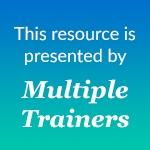
Search Results: business
-
Although we are evolutionarily designed for collaborating with others when attending to our basic needs, the weight of the systems and cultural messages we have inherited interfere. Many of us are doubtful that collaboration is possible or effective, and most of us lack both the faith and the skills to live collaboratively, regardless of cultural imperatives. Miki helps us navigate this terrain.
-
Listen to Miki make an important distinction between giving feedback, which is grounded in a desire to contribute to another, and our own need to be heard.
-
Creating a trusting connection and keeping the line of communication open are the primary prerequsites for giving feedback as a supervisor. Listen to Miki work with a course participant to ready herself for an upcoming feedback session.
-
Miki responds to a participant’s question concerning fear of consequences when speaking with a manager at work. In this excerpt, she delves into the topic of choosing to inhabit nonviolence in the workplace, affirming that fear and nonviolence are incompatible, and that nonviolence is a powerful alternative to our habitual Fight, Flight, Freeze responses.
-
Want things to change in your community, but feel frustrated or don’t know what to do? Miki’s intriguing overview of how to apply the principles of NVC to social change movements may have the exact blend of inspiration and ideas you’re seeking!
-
Join Dian Killian as she reframes the 4 steps of NVC (observations, feelings, needs, requests) into everyday words you might hear at work.
-
Enjoy Dian's overview of the 4-step model and its application to the workplace. Learn how NVC can help you: generate intrinsic motivation… discover creative solutions… create greater accountability and buy-in…reinforce behaviors you like and change others… and experience a LOT more fun, joy and aliveness at work!
-
Many of us check our full selves at the door when entering our workplace. Would you like to learn how to apply NVC principles at work instead? In this session, Jeff details how you can step into greater authenticity at work!
-
Listen in as Dian shares her tips and sense of urgency around bringing NVC skills to work: 1) How to use your imagination (visualization!) to help you connect with somatic responses and needs; and 2) Five built-in advantages to sharing NVC in the work place.
-
Join Dian Killian as she reframes the 4 steps of NVC (observations, feelings, needs, requests) into everyday words you might hear at work.
-
Lorraine Aguilar perceives NVC-based listening to be an essential skill to cultivate for success in the business world. A key exercise for building your listening muscle is to work with your judgments of others by translating those judgments from “What’s wrong with them?” to “What's important to me?"
-
If you’d like to bring more joy and fun into your workplace, listen to this trainer dialogue for NVC tips and tools from some of the leading experts in the industry.
-
In this session of Miki Kashtan's 4 session course titled Leadership Within Your Workplace she shares how most of us believe we are powerless at work – even if we’re the one “in charge.” This session offers you the opportunity to learn how to consciously change this mindset, and have a positive impact on workplace culture and attitudes along the way. Most of us believe we are powerless at work – even if we’re the one “in charge.”
-
How is empathy in the workplace a professional skill? If you are ready to learn why and how empathy is the critical factor to more productivity, profitability and collaboration in the workplace, this recording is for you!
-
- Learn concrete tools for engaging with others as you embrace individual and collective liberation
- Find your own source of choice even in the face of challenges
- Release the constriction of scarcity
- Find an empowered option to respond to what is happening in our world
- Open the door to the possibility of thriving rather than merely surviving
-
-
Trainer tip: NVC consciousness recognizes interdependence. In this process each person is autonomous; everyone's needs matter; people have choice and responsibility for their actions; there's abundance, and a valuing of coming together. The dependence / independence paradigm assumes we either need someone else to be whole -- or we don’t need others at all. Commit to living autonomously. Notice where you struggle with this.
-
Read on for a demonstration of self empathy -- all generated within the context of both the COVID-19 pandemic, and the changes to Bridget's life that have arisen as a result.
-
-


















